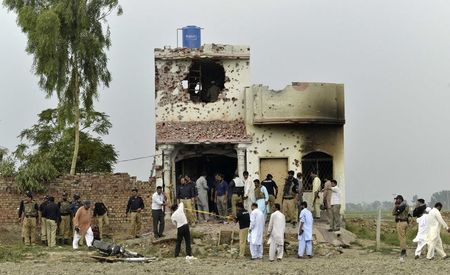By Mubusher Bukhari
LAHORE Pakistan (Reuters) - Two Pakistani policemen and a militant were killed in a shootout in the city of Lahore on Thursday a short distance from the prime minister's family home, police said.
In a separate incident underlining the threat Pakistan faces from Islamist militants, six people were killed by a roadside bomb on the outskirts of a northwestern town.
The Lahore gun battle lasted several hours and took place just over two km (a mile) from Prime Minister Nawaz Sharif's private family residence, police said.
The clash in the eastern city in the early hours of the morning came as the army carries out an offensive to clear Pakistani Taliban militants from strongholds in North Waziristan, a remote northwestern region on the Afghan border.
On Wednesday, more than 50 people were reported killed in air strikes in North Waziristan.
The military ordered North Waziristan's entire civilian population to leave when announcing the offensive on June 15 and said it would consider all those left behind to be suspected militants.
The Pakistani Taliban, who are fighting to bring down the state and impose hardline Islamist rule, vowed to carry out revenge attacks across the country in response to the offensive.
In Lahore, the two militants holed up in a house used rocket-propelled grenades and machine-guns to battle police outside. One militant was killed and the other wounded and captured, said police chief Zulfiqar Hamid. Three policemen were also wounded.
After entering the house, police found explosives and detonators, said another policeman.
Separately, a bomb blew up a bus near the city of Hangu in the northwestern province of Khyber Pakhtunkhwa killing six people and wounding five, police said.
There was no claim of responsibility.
Pakistan supported Islamists battling Soviet invaders in neighbouring Afghanistan in the 1980s but some fighters turned their guns on the Pakistani state after it was pressed into siding with the United States in its "war on terror" following the Sept. 11, 2001, attacks on the United States.

The bulk of U.S.-led foreign forces are pulling out of Afghanistan this year after nearly 13 years of inconclusive war with both it and Pakistan struggling to stem Islamist violence.
(Hasan Mehmood in Hangu contribtued to this report; Writing by Katharine Houreld; Editing by Robert Birsel)
